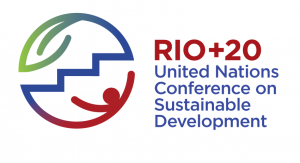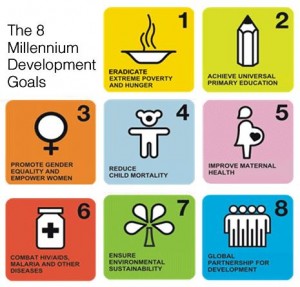20 years ago, the Rio Earth Summit took place down in Brazil. Coming up on its anniversary in June, there will be another meting of nations where commitments will be renewed and progress will be evaluated. Two new focuses will be addressed: developing a green economy in the context of sustainable development and poverty eradication, and further promoting institutions for sustainable development.
As the buildup to this conference begins, a re-examination of what has been accomplished over the last 20 years in development aid is taking place. The Rio summit in 1992 resulted in the Rio Declaration, laying out 27 principles for sustainable development and environmental preservation. Now the Rio +20 will look deeper into  these issues and evaluate which need to be further addressed or worked towards.
these issues and evaluate which need to be further addressed or worked towards.
Building from this Declaration, the UN Millennium Summit held in 2000 addressed these similar issues in a more concise and applicable manner, laying out exactly what would be done on behalf of the UN to eradicate poverty. From this meeting the Millennium Development Goals (MDG’s) were established and have since been the driving force in development. In a nutshell, by 2015 the UN hopes to eradicate extreme poverty, promote gender equality and maternal health, combat disease, and promote environmental sustainability, among others.
To backtrack a bit, on Friday of last week I attended a Members Day Conference at the UN where Jeffrey Sachs spoke about the MDG’s. The majority of the conference spoke about the meeting Rio+20, where a revisiting of these goals is needed. While not having been established at the time of the first Rio Earth Conference, these MDG’s have nonetheless played an important role in the ultimate goals we have since seen. Essentially the man behind the movement, Sachs spoke of what the goals are addressing in the buildup to Rio +20 and how end goals might be changing.
Calling this new project the Sustainable Development Goals (SDG’s), the new principles he discussed fell into 4 categories. First and foremost, they will continue to work towards ending extreme poverty and finish the projects of the MDG’s. Next, greater attention needs to be paid towards addressing environmental challenges, along the lines of agriculture, pollution, acidification and others. The third principle is based on inclusion. As Sachs described it, he argued, “We can no longer live in democracies run by money”. I am taking this to mean that the UN wishes to further promote and insist inclusion of democratic nations as well as other types of regimes, and also promote more just and democratic systems. The final principle being promoted in the SDG’s will be governance. In promoting governance, the UN will be promoting honest, participatory, and transparent interaction and policies.
These 4 goals will fit in with the overall Rio +20 themes of green sustainability and poverty eradication. I believe that these new SDG’s will work towards keeping the discussion surrounding the MDG’s going though the 2015 deadline, and promote further work into the future.
However, fundamentally, I still have issues with the application of the MDG’s. I still am unsure about how effective top down interventions have been shown to work. I still tend to be more of a proponent for bottom up interventions (as often discussed by Bill Easterly), where small and effective interventions are then scaled up for efficacy. However, I must say that Sachs has done an excellent job in bringing the attention of the UN and a more broad audience towards the needs of international development.
For the readers who are not already familiar with this debate, the method of best implementation lay at the core of development aid. The two scholars discussed above, Sachs and Easterly, argue for opposite methods as practices for implementing aid. One blog contributor Rebecca outlines the methods put forth by Sachs and the UN in her blog here, where she supports the “top down method”. This essentially is when foreign companies and institutions, such as the UN and IMF, come into a country and rearrange economic structure and decide large-scale implementations. On the opposite end of this argument, Easterly proposes the notion that we need small interventions that prove effective on ground levels, before scaling up can begin. These two sides will inherently come into play with any proposed development project, and has continued to spurn debate about best practices.
I think there will be both costs and benefits for readdressing the MDG’s in the context of future global goals.  When policy makers and stakeholders get together this June, the ultimate desire will be a call for sustainability and visible development results. In tailoring these new SDG’s towards this mission, hopefully the international community will begin seeing a congruency form in policy development. Perhaps the Rio +20 will offer an opportunity for a greater community to get involved in working towards a sustainable future, and join the work alongside the UN towards the ultimate end goal of bringing an end to extreme poverty.
When policy makers and stakeholders get together this June, the ultimate desire will be a call for sustainability and visible development results. In tailoring these new SDG’s towards this mission, hopefully the international community will begin seeing a congruency form in policy development. Perhaps the Rio +20 will offer an opportunity for a greater community to get involved in working towards a sustainable future, and join the work alongside the UN towards the ultimate end goal of bringing an end to extreme poverty.
I think that this reevaluation will be an important step forward for the development and continued discussion about aid work internationally. I argue that development at its core is not going to succeed unless it is done in a sustainable way. I feel like perhaps these SDG’s will once again bring to new light the debate I just outlined above because the aid community must understand that there are may options and perspectives in addressing many of our current world problems, and often these smaller solutions are more long-term and sustainable than larger countrywide projects. While it is often inevitable that global summits such as those on the scale of Rio+20 will produce little but words of encouragement and future promises, the discussion of a realignment between the MDG’s into the SDG’s will be beneficial for all of the developing world and aid workers involved.


